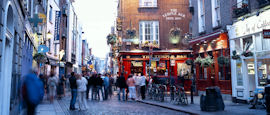Dublin History
Dublin’s earliest years are the subject of debate among historians but what is certain that by 988AD, the Norman Vikings had established a settlement at Wood Quay. Many invasions followed, most notably by the Danes, who remained until 1171 when they were forced out by Henry II of England.
Until the 17th century, Dublin was still a small, walled medieval town and a backwater in an English empire. That would all change following the English Civil War, when Oliver Cromwell paid a visit in 1649.
By the end of the 17th century, Protestant refugees from the Europe had poured into Dublin, boosting its size and filling its coffers. The rise of the British Empire brought further prosperity, although at a price: as the aristocracy grew rich, Roman Catholic peasants were oppressed and remained poor with many choosing to immigrate to the New World.
The seeds of rebellion were sown and in 1916, the Easter Rising, staged while British eyes were turned towards WWI, paved the way for independence. In 1921, following heavy fighting, the Irish Free State was declared and Dublin became its capital.
Much of the 1940s and 50s were spent building institutions and repairing damage left from the Easter Rising. But when the Troubles in Northern Ireland rose in the 1960s, it caused problems for Dublin too, most notably through bomb attacks.
Deprived inner city areas became notorious over the same period for drug-taking, organised crime, unemployment and poverty, with the result that many more citizens fled to the US.
Much of that came to an end during the boom years of the 2000s when Dublin, enjoying an unexpected surge of prosperity, became wealthy and attracted immigrants from all over Europe.
But the 2009 global meltdown brought the end of the party, with Ireland hit particularly hard by the recession and leaving the capital littered with empty construction sites. Although still not fully recovered, life and prosperity are gradually returning to Dublin.
Did you know?
• The city got its name from the original settlement’s site beside a ‘dubh linn’ – Gaelic for ‘black pool’.
• Modernist author James Joyce was born in Dublin, where he set his influential novel Ulysses.
• Ireland’s oldest pub is in Dublin. There has been a pub on the site of the Brazen Head since 1198.
Do you have any Feedback about this page?
© 2026 Columbus Travel Media Ltd. All rights reserved. No part of this site may be reproduced without our written permission, click here for information on Columbus Content Solutions.




 You know where
You know where